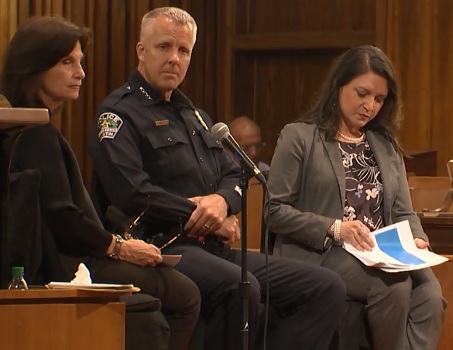(Credit: KLBJ staff)
It’s been a little more than three weeks since changes to Austin’s homeless ordinance took effect, allowing people to camp, sit, or sleep in public with very little limitation. The decision has been incredibly polarizing, and the debate has shown no signs of slowing down.
On Tuesday, the Downtown Austin Alliance hosted a public safety forum to discuss the ordinance changes, giving people the chance to hear from the private sector business community and city leaders alike. However, despite homelessness being among the biggest issues facing the city right now, city council representation was virtually nil. Mayor Steve Adler and all but one city council member chose not to attend.
Adler sent some of his staff members, and staffers for council members Ann Kitchen, Leslie Pool, and Alison Alter were also on-hand, but the council members and the mayor themselves were not. No staffers were in attendance to represent council members Jimmy Flannigan, Greg Casar, Sabino “Pio” Renteria, Paige Ellis, or Natasha Harper-Madison. Mayor pro tem Delia Garza also failed to show, nor did she send any staffers to represent her.
Council member Kathie Tovo of District 9 was the lone member of council at the forum.
I was there.
— Kathie Tovo (@kathietovo) July 24, 2019
More than 300 people packed the Central Presbyterian Church on 8th Street to get some answers. By Tuesday morning, the DAA announced the forum had been filled to capacity and anyone wishing to attend who did not have a ticket would only be allowed in on a first come, first serve basis.
Chief of Police Brian Manley spoke at length on the impact the changes have had on his officers. While acknowledging that these changes are beginning to have an effect on the way officers can address homeless complaints, he assured the city that public safety will not be affected.
“The big change for us is our ability to interact in instances that do not meet that threshold of ‘hazardous’ or ‘dangerous,’” he said. “That’s probably been the biggest change.”
Complaints have risen this month, but Manley attributes some of that to the more visible presence of the homeless now that they’ve been given the green light to pitch tents or sleeping bags almost anywhere on public land, with the exception of a few restrictions, including Austin City Hall. Manley also said homeless campsites are becoming much more elaborate since the ordinance has changed, but the full impact of that is not known as of yet.
Downtown Austin Alliance Vice President Bill Brice also spoke to the crowd, touching on the way business is being impacted by these changes. Brice has been a vocal opponent of the changes since the Public Safety Commission first began weighing the possibility of a full repeal of the ordinances in 2018. To mitigate the growing problem that businesses, live music venues, and the tourism industry are all faced with in downtown, Brice advocated for more temporary spaces to house people on the street.
“More shelter now is absolutely needed, but it can’t be the dead end that the ARCH has been for a long time. You have got to be able to move people through it, not to it,” Brice said.
The City of Austin is currently working toward opening a brand new shelter in South Austin, which in and of itself has been its own source of controversy. Austin’s homeless coordinator Veronica Briseño touched on that issue.
“Not only are we looking at additional shelter space and other solutions, but we need to look at the shelters that we have in place and make sure that they’re fully at capacity, and that our nonprofit community has the resources to do so,” Briseño said.
Tovo told KLBJ following Tuesday’s forum that she plans to return to the council dais on August 8 with some fresh ideas to address homelessness, one of which involves a public-private partnership modeled after a similar program in Dallas.
“One of the measures that I’m bringing forward is to create a local government corporation that could serve as a fundraising arm. It could include private partners, as well as represntation from the city,” she said. “That would provide one, focused organization that people could direct resources to.”
As for the future of the ordinance changes, Briseño said it’s all a work-in-progress.
“This is the initial revised ordinance that we’re working with, but I think that there’s always an opportunity to amend ordinances moving forward,” said Briseño.





